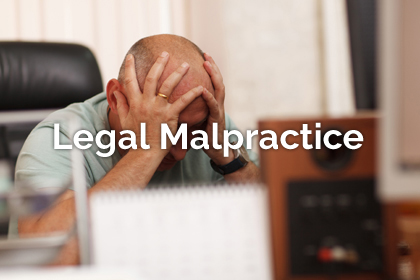This article examines the elements of a legal malpractice claim. Every client should recognize that no two cases are the same. The success or failure of a case depends upon the specific facts.
The first question is whether there was a duty owed by the attorney to the client. The easiest way to establish a duty is if there is a written Agreement for Legal Services or Retainer Agreement setting for the scope and terms for the attorney-client relationship. If there is no written agreement, an attorney-client relationship can be established through course of performance. A duty can arise even in situations where the attorney was not hired by the client, if the attorney knew the client was relying upon the attorney to do something to benefit the client.
If there is a duty by the attorney to the client, the next question is whether there was a deviation from that duty. In other words, did the attorney make a mistake, fail to act, and/or act inappropriately? There must be a standard of care expected of the attorney from which the attorney deviated. Such standard is often identified by an expert witness. Sources of standards can come from the New Jersey Rules of Professional Conduct or other sources.
Even if an attorney has deviated from the standard of care, it does not automatically mean that there is a viable legal malpractice case. The deviation must cause damages. The question is whether there is a direct causal link between the deviation and the damages alleged. If an attorney has made a mistake but it did not cause any monetary harm, there may not be a viable legal malpractice claim. Expert witnesses are often used to calculate damages caused by legal malpractice. If there are other causes of the harm, such as actions by another person over whom the attorney had no control, then there might not be causation.
If a client can potentially satisfy each step of this analysis, the claim must still be reviewed for merit by an expert at the start of the case. Whenever a licensed professional is sued in New Jersey, an Affidavit of Merit must be filed in the action that is signed by a qualified expert. During the discovery period of a lawsuit, the expert will then submit a report fully discussing the case.
If you believe that you are the victim of legal malpractice, please contact Ronald J. Wronko, Esq., at (973) 360-1001 for an initial telephone consultation.



